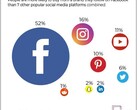As a result of government pressure, social media are forced to immediately identify and remove illegal content on their platforms. To this end, a large number of employees are still working on the screening of the illegal content, even if the censorship process is becoming increasingly automated through artificial intelligence.
However, because the current corona virus pandemic has forced companies to send a majority of their workforce home, they have to rely increasingly on the not yet precisely working AI routines.
Now Google, Facebook and Co are warning of increasing errors within this automated process. Since the goal for these companies is to avoid fines and lawsui the AI is designed so that in case of doubt it deletes content rather than ignores it. As a result, the companies warn that there may be more unwanted deletions of actually permitted videos, posts and other content in the near future.
However, it is actually not entirely clear why the process of material screening by human employees could not also take place via home office. You shouldn't need more than a computer and an internet line to do so.


















